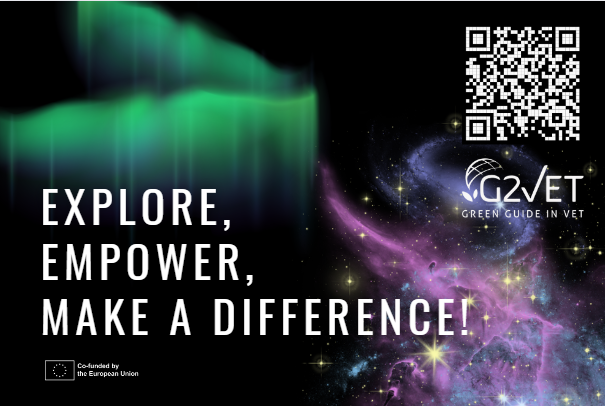Experiencing Sustainability in Action
Company visits and case studies to foster sustainability competences
The G2VET Project visits Finca Villacreces Winery
As VET project consortium, we are driven by the question of how we can effectively build up sustainable competence and teach sustainability concepts and practices to our learners.
While theoretical knowledge is important, there is no substitute for experiential learning that allows learners to see sustainability principles in action in a real-world context.
During our meeting days in Valladolid, our G2VET project team had the unique opportunity to visit Finca Villacreces, a renowned winery in the heart of Spain’s Ribera del Duero wine region near Valladolid.
This family-owned winery is undergoing a transformation process towards full sustainability, making it an ideal learning environment for our consortium.
Impressions
A Sustainable Winemaking Pioneer
Finca Villacreces has consistently followed the path of organic and biodynamic viticulture since the early 2000s, when the owner family acquired the winery.
- They cultivate their 64 hectares of vineyards according to the parameters of organic viticulture, avoiding the use of synthetic chemicals.
- They promote biodiversity through measures such as maintaining flowering meadows for natural pollination, using insect traps to control pests instead of pesticides, and using biological fungicide methods.
- The winery has obtained numerous certifications, including the “Wineries for Climate Protection (WfCP)”, label, which includes a rigorous assessment of greenhouse gas emissions, use of renewable energy, waste reduction and water management throughout its operations.
- They follow a holistic approach to sustainability, encompassing not only the vineyards but also the winery’s winemaking, office, and wine tourism activities.
- The company management is committed to environmental management based on sustainability and environmental protection criteria, from the vineyards to the various winemaking processes, offices, and wine tourism.
An Immersive Learning Experience
Our visit began with a guided bicycle tour through the estate’s vineyards, where we witnessed firsthand the biodiversity-promoting practices employed, such as flowering meadows for natural pollination, insect traps for pest control, and organic fungus prevention methods. As we pedalled along the fields of vines, our guide shared insights into the complex balance between environmental measures and quality winemaking, highlighting the long-term vision and commitment required for such an undertaking. After bicycling the vineyards, we got an insight into the winery’s production facilities, exploring sustainable practices in barrel-making, energy generation and water conservation. Each step of the process revealed the interconnectedness of the sustainability dimensions and the collaborative effort required across all departments.
It was made very clear to us that imparting sustainability goes beyond just technical knowledge. Cultivating the right values and attitudes is equally crucial. At Finca Villacreces, we witnessed how a company-wide commitment to sustainability, a shared “we” mindset, and a willingness to challenge the status quo are essential drivers of their transformation.
Finca Villacreces’ work in sustainable and organic viticulture and its comprehensive sustainability initiatives have earned it recognition as the leading sustainable winery in the Ribera del Duero region.
Lessons for us as VET Educators
For learners, such company visits offer the chance to observe these intangible yet vital elements firsthand. Seeing how employees across different roles embrace sustainability as a core value can shape learners’ own perspectives and motivations. Moreover, these experiences underscore the importance of interpersonal skills like communication, collaboration, and willingness to change – competencies that are indispensable for driving sustainable practices within any organization.
| Contextualization | Witnessing sustainability in a real-world setting allows lerners to grasp the practical applications and challenges involved, fostering a deeper understanding of theoretical concepts. |
| Multidisciplinary Approach | Sustainability goes beyond individual disciplines, requiring a holistic perspective. Visits like this highlight the interconnectivity of environmental, economic, and social factors across various operational areas. |
| Involvement | Effective sustainability implementation requires collaboration from all stakeholders within an organization. Observing this dynamic first-hand can inspire learners to develop essential communication and teamwork skills. |
| Continuous Improvement | Sustainability is an ongoing journey of adaptation and optimization. Exposing learners to companies actively navigating this process can cultivate a commitment to lifelong learning. |
To maximize the learning potential of such visits, students can prepare by researching the company’s sustainability initiatives and formulating insightful questions, such as:
- What were the key motivations and challenges in embarking on this sustainability journey?
- How did the company align all stakeholders (employees, suppliers, customers) behind its sustainability vision?
- What metrics or indicators are used to track and communicate sustainability progress?
- How does the company balance environmental goals with economic viability?
- What advice would you give to aspiring sustainability professionals?
By engaging with real-world examples like Finca Villacreces, vocational learners can develop a holistic understanding of sustainability that transcends mere theory. They gain insights into the practical realities, the mindsets required, and the multifaceted skillsets needed to drive meaningful change within their future workplaces.

